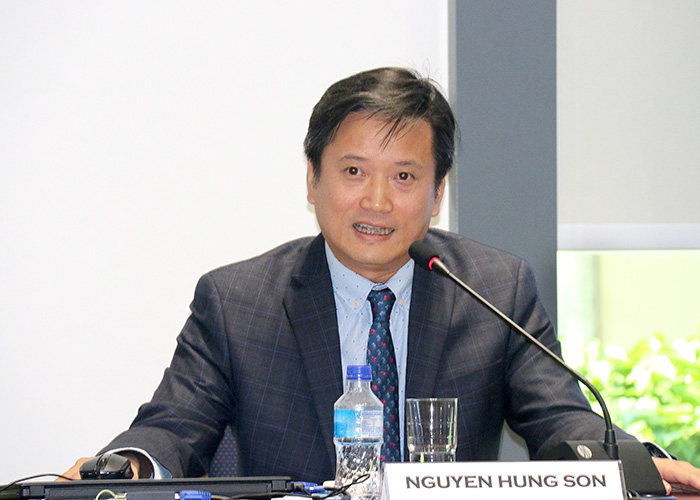This seminar brings together three prominent Track 1.5 experts from Cambodia, Indonesia, and Vietnam to discuss ASEAN’s views and responses to the Indo-Pacific concept.
Monday, 1 July 2019 – The ISEAS – Yusof Ishak Institute organised an ASEAN Studies Centre Seminar entitled, “Indo-Pacific”: Opportunities and Challenges for ASEAN on Monday, 1 July 2019. The panellists included Dr. Edy Prasetyono, Executive Director of the Centre for ASEAN Studies at the University of Indonesia; Ambassador Pou Sothirak, Executive Director of the Cambodian Institute for Cooperation and Peace; and Dr. Nguyen Hung Son, Acting Director-General of the Institute for South China Sea/East Sea Studies at the Diplomatic Academy of Vietnam. The discussion was moderated by Dr. Tang Siew Mun, Head of the ASEAN Studies Centre, ISEAS – Yusof Ishak Institute.
Presentations
Dr. Prasetyono opened the session by opining that the ASEAN Outlook on the Indo-Pacific (AOIP) very much reflects the traditional ASEAN way of cooperation that is inclusive, reaffirms ASEAN’s centrality, and emphasises the primacy of ASEAN-led mechanisms like the ASEAN Regional Forum (ARF). He stressed that both the “Indo-Pacific” and ASEAN’s view of it are still tentative, and there are lingering questions over ownership of the Indo-Pacific concept. Thus, Dr. Prasetyono suggested that one of the greatest hurdles facing ASEAN is the challenge of operationalising the AOIP.
 Dr Edy Prasetyono, Executive Director of Center for ASEAN Studies, opened the session by opining that the ASEAN Outlook on the Indo-Pacific very much reflects the traditional ASEAN way of cooperation. (Credit: ISEAS – Yusof Ishak Institute)
Dr Edy Prasetyono, Executive Director of Center for ASEAN Studies, opened the session by opining that the ASEAN Outlook on the Indo-Pacific very much reflects the traditional ASEAN way of cooperation. (Credit: ISEAS – Yusof Ishak Institute)
On an optimistic note, Dr. Prasetyono highlighted that the AOIP’s value lies in its potential to minimise strategic mistrust and miscommunication among the major powers. Crucially, he pointed out that the AOIP is not targeted against any particular external power, but is merely a reaffirmation of ASEAN’s long-cherished principles. Hence, he believes that external parties have no reason to feel threatened by the AOIP. Instead, ASEAN and its partners should work towards identifying specific areas of cooperation, especially in the maritime domain. To that end, Dr. Prasetyono suggested that ASEAN should establish working groups to facilitate such cooperation. The strengthening or modification of ASEAN mechanisms, he added, could help to augment ASEAN’s latitude and ability to engage with the Indo-Pacific. By way of conclusion, Dr. Prasetyono highlighted that debates surrounding the Indo-Pacific continue to unfold not just among ASEAN countries, but also within individual governments.
 Ambassador Pou Sothirak, Executive Director of the Cambodian Institute for Cooperation and Peace, discussed how the AOIP might hamper ASEAN’s ability to engage with the Indo-Pacific concept constructively. (Credit: ISEAS – Yusof Ishak Institute)
Ambassador Pou Sothirak, Executive Director of the Cambodian Institute for Cooperation and Peace, discussed how the AOIP might hamper ASEAN’s ability to engage with the Indo-Pacific concept constructively. (Credit: ISEAS – Yusof Ishak Institute)
Ambassador Sothirak argued that the AOIP actually goes against the traditional ASEAN way of managing relations, because the AOIP shows ASEAN’s intention to look outwards to broader regions and tougher issues. While he sees such an ambition as a welcome sign, Ambassador Sothirak asserted that it was pretentious of ASEAN to claim a leadership role on the Indo-Pacific because it lacks the ability to stake such a claim. He pointed out that ASEAN is lacking in concrete results. Highlighting the Treaty of Amity and Cooperation in Southeast Asia (TAC) as an example, Ambassador Sothirak said that the AOIP does not offer indications on how the TAC might be updated to improve its enforceability. He also added that the AOIP’s points are not as relevant to the Indo-Pacific as they are to ASEAN; this might hamper ASEAN’s ability to engage with the Indo-Pacific concept constructively. In his concluding remarks, Ambassador Sothirak highlighted that the AOIP ignored important topics like the Lancang-Mekong Cooperation Forum and China’s Belt and Road Initiative (BRI).
 Dr Nguyen Hung Son, the Acting Director-General, Institute for South China Sea/East Sea Studies of the Diplomatic Academy of Vietnam, spoke on how ASEAN has to remain adaptable in order to bolster its claim to centrality in the region. (Credit: ISEAS – Yusof Ishak Institute)
Dr Nguyen Hung Son, the Acting Director-General, Institute for South China Sea/East Sea Studies of the Diplomatic Academy of Vietnam, spoke on how ASEAN has to remain adaptable in order to bolster its claim to centrality in the region. (Credit: ISEAS – Yusof Ishak Institute)
Dr. Nguyen began his remarks by suggesting that the principles espoused in the AOIP – such as keeping the Indo-Pacific open and inclusive – mirrored the values that underpin the liberal order championed by the United States and its Western allies. Turning to the issue of how ASEAN should engage with external stakeholders on the Indo-Pacific concept, he highlighted that we must view ASEAN’s response as evolutionary and incremental. The AOIP is ASEAN’s first word on the Indo-Pacific, but certainly not its last. Indeed, ASEAN has to remain adaptable in order to bolster its claim to centrality in the region. Crucially, Dr. Nguyen cautioned against conflating relevance with centrality; foreign powers may recognise the former but not necessarily the latter. To conclude, Dr. Nguyen pointed to new directions for inquiry and cooperation, suggesting that it is the intersection between the maritime and other domains that will define the Indo-Pacific’s future. ASEAN therefore has to improve its capacity to manage interactions in this nexus if it wishes to cement both its relevance and centrality.
 The seminar was very well-attended. (Credit: ISEAS – Yusof Ishak Institute)
The seminar was very well-attended. (Credit: ISEAS – Yusof Ishak Institute)


